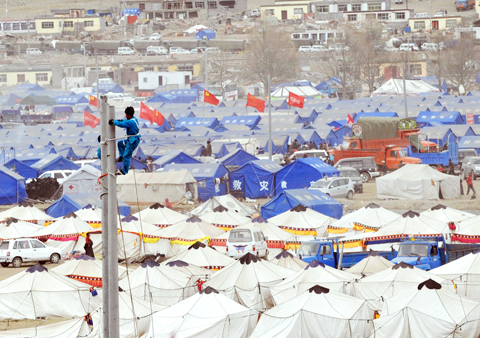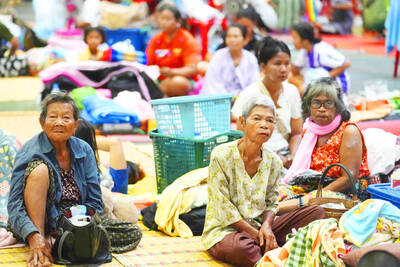Heavy construction machinery and trucks carrying aid to earthquake survivors clogged streets yesterday morning as this shattered town in remote western China turned to rebuilding and search teams and other rescuers left.
Thousands of Tibetan Buddhist monks stayed in Jiegu, however, picking at rubble with shovels, performing funeral rites and throwing food from the backs of trucks.
Bedraggled survivors streamed from their tents and chased the trucks, the women scooping bread rolls and packets of instant noodles into the aprons of their traditional fur-lined robes.

PHOTO: EPA
Army trucks sprayed water on roads to reduce dust, and mobile toilets arrived — just in time as the spread of diseases was becoming a concern after more than five days without running water.
Classes resumed at Yushi No. 3 Elementary School, with hundreds of students taking lessons in classrooms set up in tents. Most wore the blue-and-white school uniforms they had on when their classrooms collapsed on Wednesday.
The quake killed 1,706 people and injured 12,128. Xinhua news agency reported that at least 66 children and 10 teachers died, but that total was likely to climb as more remained missing.
The children trooped into the tents filled with small wooden desks and chairs salvaged from the rubble.
“Confidence! Hope!” the children chanted, led by volunteers from Beijing who had organized the temporary classrooms and were planning to build permanent ones.
“On the one hand, students are coming back to resume classes. On the other hand, we are giving the students some psychological treatment after the disaster. We are trying to help them forget the disaster and not feel scared anymore,” said Danzeng Jiangcuo, a sixth-grade math teacher.
“Most of the students are living with their families and relatives. Every morning we notify them that classes start at 9am and finish at noon,” he said.
Painful reminders of the disaster were everywhere. Just behind the tent classrooms, hundreds of monks in crimson robes sat on the playground singing sutras, or prayers, for about a dozen earthquake victims whose bodies were stacked in the back of a nearby truck.
Their mournful voices mixed with the sounds of the children reciting their lessons.
“It’s Buddhist nature to help those in need,” said Cijia, a 21-year-old Buddhist student from a school in neighboring Sichuan Province 300km away.
He said monks have been performing funeral rites twice a day, morning and night.
The 1,200 monks from his school have no income and paid 500 yuan to 600 yuan (US$73 to US$87) each out of their pocket money to volunteer in Jiegu.
The surge in aid came as Chinese President Hu Jintao (胡錦濤), who cut short an official trip to South America to deal with the disaster, arrived on Sunday to inspect relief work at the remote Tibetan region where residents have frequently chafed under Chinese rule.
He visited displaced families living in tents and promised that the Communist Party and the government was doing everything they could. Tibetan anger over political and religious restrictions and perceived economic exploitation by the majority “Han” Chinese have sometimes erupted in violence.

POLITICAL PATRIARCHS: Recent clashes between Thailand and Cambodia are driven by an escalating feud between rival political families, analysts say The dispute over Thailand and Cambodia’s contested border, which dates back more than a century to disagreements over colonial-era maps, has broken into conflict before. However, the most recent clashes, which erupted on Thursday, have been fueled by another factor: a bitter feud between two powerful political patriarchs. Cambodian Senate President and former prime minister Hun Sen, 72, and former Thai prime minister Thaksin Shinawatra, 76, were once such close friends that they reportedly called one another brothers. Hun Sen has, over the years, supported Thaksin’s family during their long-running power struggle with Thailand’s military. Thaksin and his sister Yingluck stayed

FOREST SITE: A rescue helicopter spotted the burning fuselage of the plane in a forested area, with rescue personnel saying they saw no evidence of survivors A passenger plane carrying nearly 50 people crashed yesterday in a remote spot in Russia’s far eastern region of Amur, with no immediate signs of survivors, authorities said. The aircraft, a twin-propeller Antonov-24 operated by Angara Airlines, was headed to the town of Tynda from the city of Blagoveshchensk when it disappeared from radar at about 1pm. A rescue helicopter later spotted the burning fuselage of the plane on a forested mountain slope about 16km from Tynda. Videos published by Russian investigators showed what appeared to be columns of smoke billowing from the wreckage of the plane in a dense, forested area. Rescuers in

‘ARBITRARY’ CASE: Former DR Congo president Joseph Kabila has maintained his innocence and called the country’s courts an instrument of oppression Former Democratic Republic of the Congo (DR Congo) president Joseph Kabila went on trial in absentia on Friday on charges including treason over alleged support for Rwanda-backed militants, an AFP reporter at the court said. Kabila, who has lived outside the DR Congo for two years, stands accused at a military court of plotting to overthrow the government of Congolese President Felix Tshisekedi — a charge that could yield a death sentence. He also faces charges including homicide, torture and rape linked to the anti-government force M23, the charge sheet said. Other charges include “taking part in an insurrection movement,” “crime against the

POINTING FINGERS: The two countries have accused each other of firing first, with Bangkok accusing Phnom Penh of targeting civilian infrastructure, including a hospital Thai acting Prime Minister Phumtham Wechayachai yesterday warned that cross-border clashes with Cambodia that have uprooted more than 130,000 people “could develop into war,” as the countries traded deadly strikes for a second day. A long-running border dispute erupted into intense fighting with jets, artillery, tanks and ground troops on Thursday, and the UN Security Council was set to hold an emergency meeting on the crisis yesterday. A steady thump of artillery strikes could be heard from the Cambodian side of the border, where the province of Oddar Meanchey reported that one civilian — a 70-year-old man — had been killed and